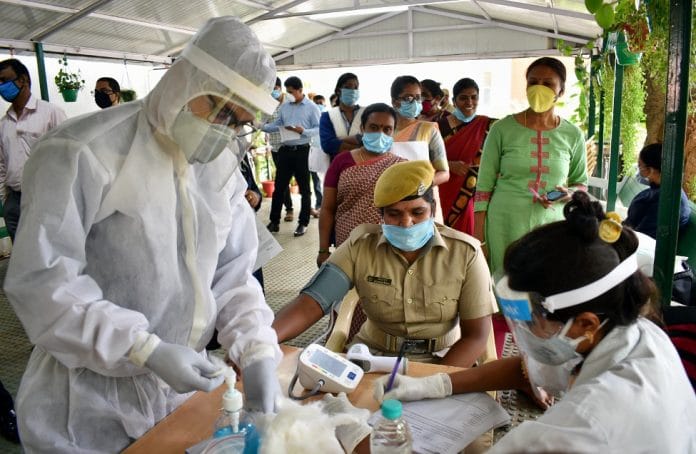Bengaluru: Karnataka’s Medical Education Minister Dr K. Sudhakar has acknowledged that “cluster and community” transmission of Covid-19 has begun in the state, and said the responsibility of curbing the spread rests with its people.
The acknowledgment, a first by the state government, comes amid a spike in Covid-19 cases in Karnataka and the rest of the country.
“It is now between a cluster and community spread. Unless civic sense prevails on people and they take home quarantine seriously, there will be a bigger surge and the possibility of a vast community spread,” Dr Sudhakar told ThePrint.
Dr Sudhakar, who was hand-picked by Chief Minister B.S. Yediyurappa to handle the Covid-19 crisis in the state, is the first minister to say there has been community transmission within Covid-19 clusters.
“While one cannot deny the fact that post lockdown there has been a surge in cases due to influx of people from more infected states, many also did not strictly follow home quarantine rules, leading to further spread among their family members and primary contacts,” he added.
Karnataka reported its biggest single-day spike of 918 new Covid-19 positive cases on 27 June. The total number of cases in Karnataka has reached 13,190 so far, including 783 from Bengaluru Urban.
Calling the spike in cases a “natural progression of the pandemic”, epidemiologist and member of the state expert committee on Covid-19, Dr Giridhar Babu, said Karnataka did very well during the lockdown by maintaining strict containment zones that stopped local transmissions.
“As a testimony, you can see that most cases which were detected in the initial period, after the lockdown was lifted, were mostly from outside the state. Following the cases imported from other states, there is local transmission now. People in the entire state is susceptible to the infection…The surge in cases has just begun in Karnataka,” Babu told ThePrint.
Explaining community transmission, Babu added, “The World Health Organization classifies countries/territories/areas by type of transmission of coronavirus disease 2019 infection. It specifies community transmission as evidenced by a large number of cases with an inability to link the confirmed cases through chains of transmission, or from sentinel laboratory surveillance, and multiple unrelated clusters in multiple areas.”
Also read: Covid is war, policemen who die fighting it deserve martyr status: Karnataka DGP Sood
Bengaluru saw maximum violations
According to the Karnataka Covid-19 war room data from 27 June, out of 1,13,661 people who were under home quarantine in Karnataka, 7,693 had breached rules. A total of 338 FIRs have been filed against violators till date.
The data also states that Bengaluru Urban has seen the maximum number of violations. Of 65,560 people under home quarantine, 2,244 had violated rules and FIRs against 84 have been registered so far.
The second place to have the most number of violators is Belagavi. While 4,827 people have been kept under home quarantine here, 521 are said to have breached norms. Two FIRs have been filed so far.
Vijayapura stands third, with 510 violations from among 2,323 people under home quarantine.
“Bengaluru has been particularly bad in following quarantine rules. There have been a good amount of violations. We are still in the process of assessing, while our government staff and volunteers visit homes. More than 50 per cent of such houses have been personally visited and checked. Our work is in progress,” said IAS officer Munish Moudgil, who heads the state Covid-19 war room.
Karnataka Director General of Police (DGP) Praveen Sood said there is a protocol in place to handle violators.
“People are taking home quarantine quite lightly. First time they are caught, we warn them. Second time, we send them to institutional quarantine. If they try to run away from there as well or not home quarantine themselves, the instruction is to book an FIR against them. We are extremely strict in imposing rules,” Sood told ThePrint.
Also read: ‘Man of data & details, a cricket lover’ — the IAS officer driving Karnataka’s Covid fight
Citizen squad
The Karnataka government has requested citizens’ groups and NGOs to join hands with the government-run home quarantine squads to help track, trace and report violators.
Authorities believe booth-level tracking will deter those under quarantine to flout norms.
Captain P. Manivannan, Secretary, Animal Husbandry, and one of the officers leading the Bengaluru home quarantine task force, said “enough warnings” have been issued and any person found violating home quarantine norms now will be shifted to institutional quarantine at their own costs.
“As of now, 977 violations have been registered and 81 FIRs registered. In Bengaluru city, our team have been checking on those who have been asked to undergo strict home quarantine daily. Many who have registered on the Seva Sindhu portal provided addresses that are not traceable. We need the help of citizens’ teams to speed up work,” Manivannan told ThePrint.
Sudhakar also said there was a need to categorise patients into three groups — mild, moderate and severe. Mild and moderate groups should be kept in Covid care centres while the severe cases treated in hospitals, he said.
“People should be admitted within six hours of their test results. That is how quickly it should be reported,” he added.
Huge backlog of tests
State government officials attribute the sudden spike in the numbers to delayed testing of samples. This is partly due to the shutting down of two major laboratories at the Bangalore Medical College and Research Institute and the National Institute of Mental Health and Neuro-Sciences, where at least two employees had tested positive.
Both laboratories together handled close to 2,000 samples a day and they have been closed for more than a week now.
Data from the state health department shows an average of 14,000 tests per day while the number of samples that are yet to be tested rose from 3,038 to 11,640 in the past couple of days.
Also read: How big city Bengaluru managed to beat coronavirus while Mumbai, Delhi, Chennai struggle






